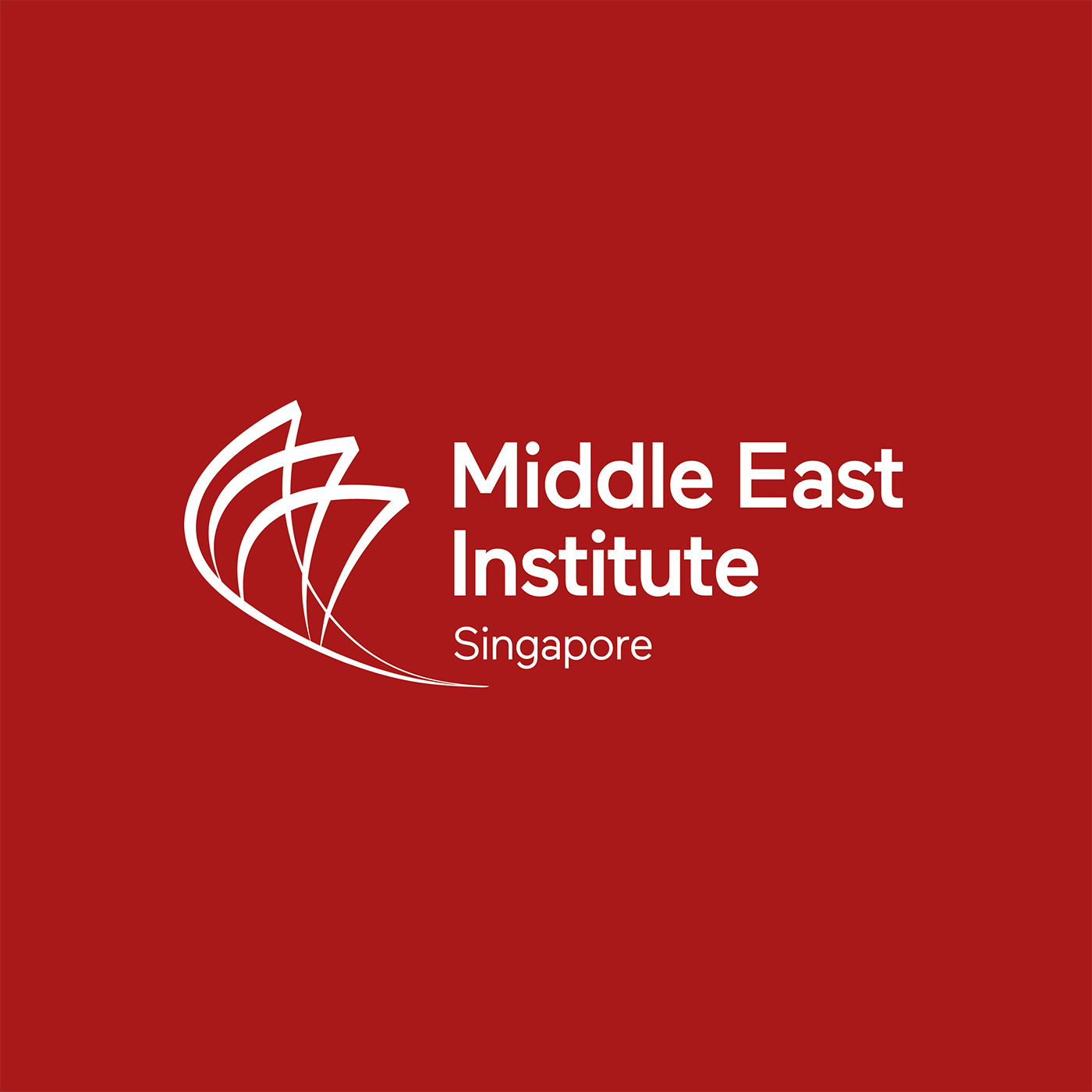Episodes
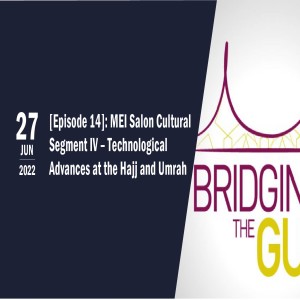
Friday Jul 01, 2022
MEI Salon Cultural Segment IV - Technological Advances at the Hajj and Umrah
Friday Jul 01, 2022
Friday Jul 01, 2022
Since the introduction of a quota system for the Muslim pilgrimage in 1988, calls for increased hajj quotas by different countries have been ceaseless. Annually, administrative arrangements, including the deployment of speedy transportation, have been constantly revisited and improved. Technology, particularly the mobile phone, has not only brought ease, and more pilgrims, to the hajj, but has also enhanced the experience. From planning to tracking (via GPS) and the use of PDF guides, technology has substantially increased the flow of useful information to pilgrims.
Covid-19 saw an increase in the use of technology to keep worshippers safe. Besides an online registration system, robots were employed to sanitise the Grand Mosque, and to distribute bottled water for social distancing purposes. As health restrictions are eased and travel becomes increasingly possible, the hajj looks to return to pre-pandemic levels. How will new technologies help organisers and pilgrims alike?
The Middle East Institute (NUS), in collaboration with the Prince Saud Al Faisal Institute for Diplomatic Studies, hosted HE Dr Amr Almaddah, the Deputy Minister for Hajj and Umrah Services, to address these questions and more.
This event is also supported by the Royal Embassy of Saudi Arabia in Singapore.
Speaker: HE Dr Amr Al Maddah, Deputy Minister for Hajj and Umrah Services, Ministry of Hajj and Umrah
HE Dr Amr Al Maddah is the Deputy Minister for Hajj and Umrah Services at the Ministry of Hajj and Umrah. Dr Almaddah received his PhD in intelligent systems and applied informatics from Osaka University in Japan. After his return to Saudi Arabia, he worked in King Abdullah Petroleum Studies and Research Center before moving to King Abdulaziz University as an academic staff. Prior to his work in the Ministry, Dr. Almaddah served in many senior management roles in big entities in the government and private sectors such as Saudi Research and Marketing Group (SRMG) and The Prince Mohammed bin Salman Foundation (MiSK). Dr Almaddah speaks many languages fluently and is always seeking opportunities to make a difference.
This event was hosted on 27 June, 2022.
![[Boots Off the Ground: Security in Transition in the Middle East and Beyond] Episode 28: From Unit 8200 to Cybersecurity Training](https://pbcdn1.podbean.com/imglogo/ep-logo/pbblog4563756/BOTG-LOGO-72-ppi-1024x576_300x300.jpg)
Monday Jul 25, 2022
Monday Jul 25, 2022
Mr Roy Zur, retired major from the Israeli Defence Force – Unit 8200 – discusses the future of cyber warfare and cyber intelligence.
This podcast series is presented by Dr Alessandro Arduino, Principal Research Fellow at the Middle East Institute, National University of Singapore.
![[Book Talk] Digital Authoritarianism in the Middle East](https://pbcdn1.podbean.com/imglogo/ep-logo/pbblog4563756/book-cover-1-4-700x461_1__ptz59q_300x300.jpg)
Thursday Jul 28, 2022
[Book Talk] Digital Authoritarianism in the Middle East
Thursday Jul 28, 2022
Thursday Jul 28, 2022
Disinformation can lead to indoctrination, which can in turn lead to incitement. The Arab world has been a victim of violence incited by an information disorder. Who wields the “stick” of (dis)information? Social media and digital technology, which helped fuel the Arab Spring, is now being used as a tool of counter-revolutionary repression to protect the authoritarian status quo across the MENA region, especially from perceived ‘Islamist’ threats and Iranian expansionism. Up until now the study of disinformation, which has tended to frame Russia and China as forces undermining Western security, has rarely examined the Middle East and Western-allied Gulf states.
In this webinar, Dr Marc Owen Jones explains the chains of information operations in the Middle East, particularly the main projectors of digital media power in the Gulf Arab states. Describing a new era of Gulf politics as a “post-truth moment,” Dr Jones argues that digital technology has been employed in influence operations to the degree that right-wing American policy and foreign policy of Gulf states intertwine.
Dr Jones’ upcoming book, Digital Authoritarianism in the Middle East, will also address issues such as sportswashing, pseudo-reality industries, and the silencing of journalists and women. Join the Middle East Institute for this book talk with the author.
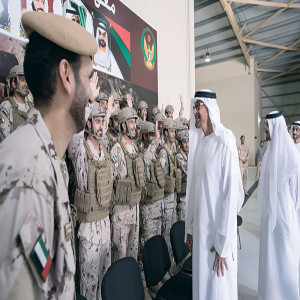
Sunday Aug 07, 2022
One Jump Ahead: Is the UAE leading the Gulf pack?
Sunday Aug 07, 2022
Sunday Aug 07, 2022
Towards the end of 2021, the late President of the UAE, Sheikh Khalifa bin Zayed approved an extensive list of legal reforms. New laws and updated legislation span the business, labour, family, personal status, crime, intellectual property and e-commerce sectors. Of note is a new law permitting investors and entrepreneurs to completely own onshore companies in all sectors – a significant departure from previous practice that guaranteed the UAE national major shares in any company. On the social front, the move to decriminalise consensual relationships outside of marriage is another novelty. Is the motivation behind these changes the creation of a more attractive business environment? How far ahead is the UAE in socio-economic terms, relative to its neighbours?
Following his ascension, the new President, Sheikh Mohamed bin Zayed, has shown no signs of slowing down. From a directive granting children of Emirati mothers the same benefits as other citizens in education and health to a financial package for low-income citizens, he has shown his penchant for supporting domestic constituencies. What is the strategy for harmonising policies among the seven emirates? Crucially, how will the GCC states develop a sustainable plan for Covid-resilience? Are there any social trade-offs for such moves?
Besides examining the UAE’s first-mover advantage, this roundtable will also look at intra-GCC economic competition, with Riyadh and Doha snapping at Abu Dhabi’s heels. The Middle East Institute will welcome two experts, Mr Nasser Al Shaikh and Dr Omar Al-Ubaydli, to address these issues and more.
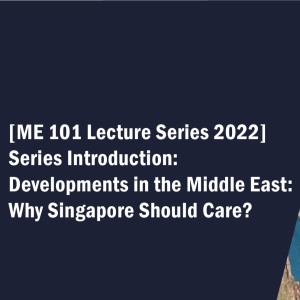
Monday Aug 22, 2022
ME 101 Lecture Series 2022 - Series Introduction
Monday Aug 22, 2022
Monday Aug 22, 2022
Throughout history, the Middle East has been locked in engagements with the West through crusades, wars, colonialism and terrorism. However, beyond the clichés and convenient facades lie many lesser known facets from economic transformation to climate change. This lecture series will give you a comprehensive overview of the region and its impacts on Singapore and the world.
![[Boots Off the Ground: Security in Transition in the Middle East and Beyond ] Episode 29: Digital Authoritarianism](https://pbcdn1.podbean.com/imglogo/ep-logo/pbblog4563756/BOTG-LOGO-72-ppi-1024x576_cgrzez_300x300.jpg)
Tuesday Aug 30, 2022
Tuesday Aug 30, 2022
Dr. Marc Owen Jones discusses digital authoritarianism, the recent developments in technology and tactics of repression in the Middle East.
This podcast series is presented by Dr Alessandro Arduino, Principal Research Fellow at the Middle East Institute, National University of Singapore.
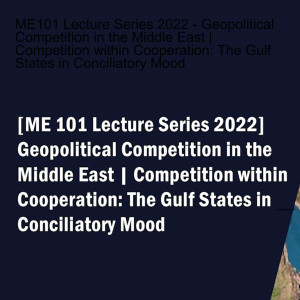
Wednesday Aug 31, 2022
Wednesday Aug 31, 2022
Throughout history, the Middle East has been locked in engagements with the West through crusades, wars, colonialism and terrorism. However, beyond the clichés and convenient facades lie many lesser known facets from economic transformation to climate change. This lecture series will give you a comprehensive overview of the region and its impacts on Singapore and the world.
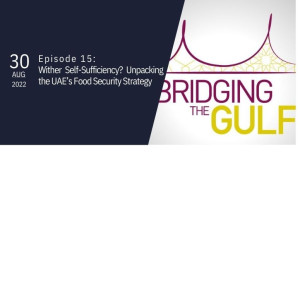
Tuesday Sep 06, 2022
Tuesday Sep 06, 2022
Concerns about food global food supplies have been exacerbated by the Russia-Ukraine crisis, compelling states across the Middle East and North Africa to revisit their food security policies. The UAE, for one, announced its “National Food Strategy 2051” in 2018, and has since acquired substantial agricultural and food production assets from Latin America to South Asia. It also aims to become a major player in the production and distribution of fertiliser, while combining this approach with sustainability policies (particularly renewable energy) and the acquisition of shares in global food commodity trading firms.
Considering that the UAE imports 80 to 90 per cent of its food, how does it address the perennial debate between imports and self-sufficiency? Is value chain management a more appropriate strategy than farmland investments? How does Abu Dhabi manage food accessibility for vulnerable groups such as migrant workers? More broadly, what is the future of global security as several crises loom?
On 30 August, The Middle East Institute hosted H.E. Dr. Abdulnasser Al Shaali, the UAE’s Assistant Minister for Economic and Trade Affairs, as he addressed these questions and more.
For more information about this event, click here: https://mei.nus.edu.sg/event/bridging-the-gulf/
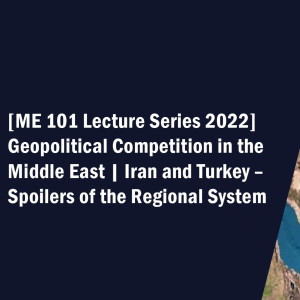
Wednesday Sep 07, 2022
Wednesday Sep 07, 2022
Throughout history, the Middle East has been locked in engagements with the West through crusades, wars, colonialism and terrorism. However, beyond the clichés and convenient facades lie many lesser known facets from economic transformation to climate change. This lecture series will give you a comprehensive overview of the region and its impacts on Singapore and the world.
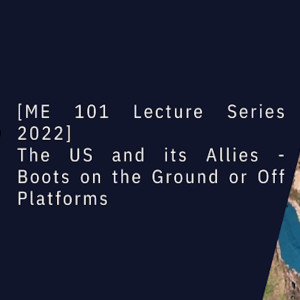
Tuesday Sep 13, 2022
Tuesday Sep 13, 2022
Throughout history, the Middle East has been locked in engagements with the West through crusades, wars, colonialism and terrorism. However, beyond the clichés and convenient facades lie many lesser known facets from economic transformation to climate change. This lecture series will give you a comprehensive overview of the region and its impacts on Singapore and the world.

